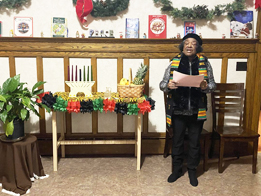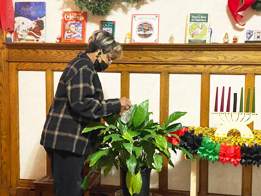
By Dawn Scotland
Sojourner’s Truth Reporter
While many Kwanzaa celebrations were held virtually this year, The Padua Center hosted its annual Kwanzaa Celebration in person Tuesday, December 28. The evening included the lighting of the Kinara, Libation ceremony, reading of the Nguzo Saba and sharing of the Kakramu (Kwanzaa Feast).
Phyllis Toney, mistress of ceremonies, and board member of the Padua Center presented the welcome to a gathering of community members and parishioners.
With permission from Elder Art Jones, executive director of No More Domestic Violence Inc., the celebration began.
“Created in 1966 by Maulana Ron Karenga, Kwanzaa is an African American and Pan-African holiday that celebrates history, values, family, community and culture.” (source https://nmaahc.si.edu) It last for seven days, the day after Christmas until the first of the new year (Dec 26- Jan 1). The colors of Kwanzaa are black (representing the people), red (representing struggle and blood shed) and green (representing the fertile land of Africa).
Participants around the room read the Ngoza Saba (the seven principles of Kwanzaa):
- Umoja (Unity) – To strive for and maintain unity in the family, community, nation, and race.
- Kujichagulia (Self-Determination) – To define ourselves, name ourselves, create for ourselves and speak for ourselves.
- Ujima (Collective Work and Responsibility) – To build and maintain our community together and make our community’s problems our problems and to solve them together.
- Ujamaa (Cooperative Economics) – To build and maintain our own stores, shops and other businesses and to profit from them together.
- Nia (Purpose) – To make our collective vocation the building and developing of our community in order to restore our people to their traditional greatness.
- Kuumba (Creativity) – To do always as much as we can to leave our community more beautiful and beneficial than we inherited it.
- Imani (Faith) – To believe with all our hearts in our people and the righteousness and victory of our struggle. (According to https://nmaahc.si.edu)

June Boyd, public servant, and longtime member of St. Martin de Porres Church, lead the libation. The libation ceremony is a Kwanzaa tradition where those present commemorate elders that have passed on and pathed the way for those living. The names are spoken aloud while an elder pours libation on a living plant. Those ancestors commemorated included Bishop Desmond Tutu, Rosa Parks, John Lewis and deceased family members of those present among others.
Sister Virginia Welsh, executive director of the Padua Center, lit three candles in the Kinara (candle holder) with Tuesday signifying the third day in the Kwanzaa celebration. Participants spoke in the front of the room to share the Ngoza Saba (seven principles) discussing pressing issues facing our community including voting rights, domestic violence, community resources, the family unit, gun violence, policing and education.
The event concluded with the Kakramu (the Feast at the End of Kwanzaa). Due to covid restrictions the food was prepackaged.
To learn more about the Padua Center or to volunteer contact 419-241-6465 or visit paduacenter.org.




